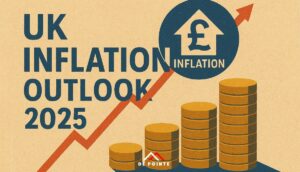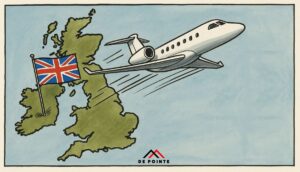Article

The trade tariff war that erupted in early 2025 has stirred the global financial landscape. Initiated by the U.S. under President Trump, this series of tariffs aims to address trade imbalances and support domestic manufacturing. With the imposition of a 10% tariff on all imports and additional penalties targeting specific countries such as China and the European Union, the economic ripple effect has been swift and far-reaching.
In this blog post, we’ll explore how these tariffs impact investors and provide insight into the strategies they can employ to navigate the ongoing uncertainty.
Understanding the Trade Tariff War
The trade tariff war marks a significant shift in global trade relations. The U.S. government’s decision to impose tariffs on a wide range of imported goods aims to curb trade deficits, boost local industries, and bring jobs back to American shores. However, this move has come with substantial consequences for the global economy. International trade has been disrupted, leading to higher costs for consumers and businesses.
The most immediate market reaction was felt in the stock markets. On the day the tariffs were announced, global equities took a sharp downturn, with the Dow Jones Industrial Average suffering one of its most significant two-day drops in history. Countries heavily reliant on exports, such as Japan and Germany, saw substantial declines in their stock indexes, reflecting the concerns over economic slowdowns due to the higher costs of goods and potential retaliation.
Immediate Market Reactions and Volatility
The most noticeable effect of the trade tariff war has been increased volatility across international markets. Asian stock markets, notably Japan’s Nikkei Index, experienced a significant plunge, with the index dropping by almost 8%—a move that prompted temporary trading halts. The S&P 500 and Nasdaq Composite entered correction territory, signalling widespread concerns among investors.
As the tariffs have continued to unfold, many industries—especially those involved in global supply chains—are feeling the pressure. Companies that rely heavily on imported goods or export products to affected markets are likely to face higher costs, which could ultimately lead to reduced profitability.
How Tariffs Impact Investors
1. Stagflation Risks
One of the most pressing concerns for investors is the possibility of stagflation. Stagflation is a unique economic condition in which inflation rises even as economic growth slows. This scenario can create a challenging environment for investors, as rising prices can erode purchasing power while stagnating growth reduces the potential for investment returns.
Higher import tariffs can lead to increased production costs for companies that rely on foreign goods. These price hikes could be passed on to consumers, leading to inflationary pressures. At the same time, reduced global trade may slow economic growth, putting the economy in a precarious position. Investors must be prepared for this potential scenario by staying informed and adjusting their portfolios accordingly.
2. Sectoral Winners and Losers
While the tariff war may bring challenges, it also presents investment opportunities in specific sectors. Industries that are less dependent on global trade or those benefiting from the protectionist measures could prove to be more resilient.
For instance, U.S.-focused industries such as construction and manufacturing may see a boost due to the tariffs aimed at reviving domestic production. On the other hand, companies involved in technology or retail that rely on imported components may struggle with rising input costs.
Investors should closely monitor which sectors are most affected by tariff policies and adjust their portfolios based on these insights. Understanding the specific impact of tariffs on different industries can provide a strategic advantage in volatile markets.
3. Diversification is Key
In times of economic uncertainty, diversification remains one of the most effective strategies for managing risk. A diversified portfolio that includes a mix of domestic and international assets, as well as exposure to various sectors, can help mitigate the potential downside of trade conflicts.
For example, while U.S. stocks may suffer due to the trade tariffs, other markets—such as those in emerging economies or industries like healthcare and consumer staples—may provide growth opportunities. By balancing investments across various asset classes, investors can safeguard their portfolios against significant market fluctuations.
4. Monitor Policy Developments
The trade war is dynamic, and policies can shift rapidly. Investors should keep a close eye on any new trade agreements, retaliatory tariffs, or changes in government policy. As countries work to negotiate new deals or resolve disputes, the economic landscape may shift.
Staying informed about trade negotiations and the broader geopolitical landscape is crucial for investors who want to make timely, data-driven decisions. Unexpected policy changes can offer new opportunities or increase risks, so a proactive approach is key.
Expert Perspectives on the Trade Tariff War
Financial experts are divided on the tariff war’s long-term impacts. Some economists warn that prolonged trade tensions could lead to a global recession. In contrast, others argue that the tariffs may spur economic growth in certain regions as they force businesses to rely more on local production.
Notably, UBS Global Wealth Management has recently upgraded U.S. equities to “attractive,” citing the potential for growth despite the current trade uncertainties. This perspective reflects a more optimistic outlook on the U.S. economy, where structural factors like low unemployment and strong consumer spending could counterbalance the adverse effects of tariffs.
The 2025 trade tariff war has introduced a new layer of complexity to the investment landscape. While it has led to significant market volatility, it also presents opportunities for strategic investors who understand the dynamics at play. By staying informed, diversifying their portfolios, and focusing on sectors less vulnerable to tariffs, investors can better position themselves to navigate this uncertain period.
As the situation evolves, keeping a close watch on policy changes and market trends will be essential for making informed investment decisions. Whether the trade tariff war leads to short-term volatility or long-term changes, investors who remain adaptable and vigilant will be best positioned for success in the months ahead.
Disclaimer: This article is for informational purposes only and should not be construed as financial advice. Always consult with a qualified financial advisor before making investment decisions.





